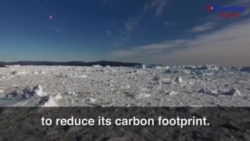Terrorist attacks in Paris are not expected to stop the United Nations from hosting a major climate conference in that city.
Next week nearly 120 heads of state and government will gather in the City of Lights to discuss ways to cut harmful pollution.
President Barack Obama, China's Xi Jinping and Russia's Vladimir Putin are scheduled to attend. They will try to reach an agreement to fight changes in the Earth’s climate.
The meeting is known as COP21. The U.N. says it wants an agreement among nations to limit the rise in world temperatures to 2 degrees Celsius.
Before the terrorist attacks, France hosted a pre-summit meeting. France's Laurent Fabius told journalists that “the task ahead is considerable.”
Governments are discussing how to lower harmful gas released from burning fossil fuels, like oil and gasoline. These have been blamed for climate change.
Experts warned recently that a major glacier in Greenland is quickly melting and falling into the Atlantic Ocean.
If the entire glacier in the northeast of Greenland melts and falls, global sea levels could rise by a half meter.
The study, published in the journal Science, said the glacier melted three times faster than earlier. Known as Zachariae Isstrom, the glacier is losing 5 billion tons of mass per year, according to the study.
The glacier is dumping many icebergs into the ocean. That will raise sea levels in future decades, Jeremie Mouginot wrote. He is the study’s lead author and a professor at the University of California-Irvine.
The study based its findings on 40 years of data from satellite and aerial surveys. They looked at the shape, size and position of glacial ice.
Warmer ocean water is eroding the glacier from below. Warmer air temperatures are melting it from above. Another Greenland glacier is also melting, but not as quickly because it is in a protected location.
The study said the two glaciers make up 12 percent of the Greenland ice sheet. It said if they fully collapse, that would increase global sea levels by more than one meter.
Greenland is near the icy North Pole of the planet.
However, another recent study said that ice in Antarctica at the South Pole is growing.
In the Journal of Glaciology, NASA said satellites showed the Antarctic ice sheet gained 112 billion tons of ice from 1992 to 2001. The gain slowed to 82 billion tons from 2003 to 2008.
That is what Jay Zwally said. He is a glaciologist with the NASA Goddard Space Flight Center in Greenbelt, Maryland. He is the study’s lead author.
Critics question the study. Many other studies have found that Antarctica is generally losing ice.
Zwally said he agrees with others that ice is melting in the Antarctic Peninsula and West Antarctica.
But, he says that East Antarctica and other parts are gaining ice.
“There, we see an ice gain that exceeds the losses in the other areas,” he said.
Zwally and his team used satellites to measure changes over large and small areas.
Snowfall is not common in Antarctica because it is technically a desert. Antarctica is a dry desert, with cold, brutal weather.
I’m Anne Ball.
Anne Ball wrote this story from information on VOANews.com and wire stories. Kathleen Struck was the editor.
Are you worried about climate change? Does it impact where you live through flooding, hotter temperatures, cyclones or other climate events? Leave a comment here or post on our Facebook page.
_____________________________________________________________
Words in This Story
summit –n. a meeting of leaders to discuss a subject
glacier –n. a very large area of ice moving slowly down a slope or wide area of land
erode (ing) –v. to gradually destroy something by natural forces
exceeds -v. goes beyond something else
brutal - adj. harsh





